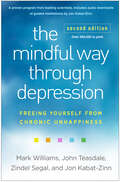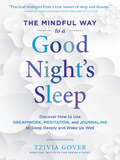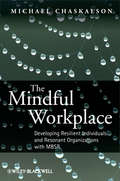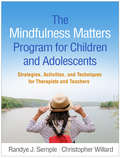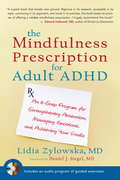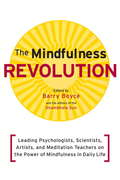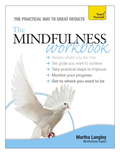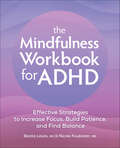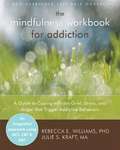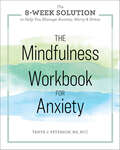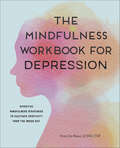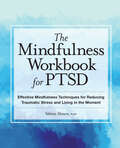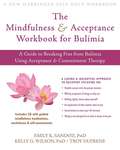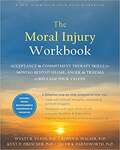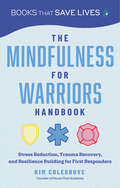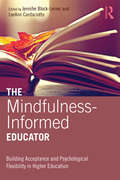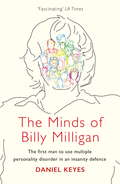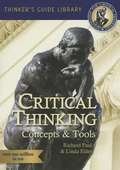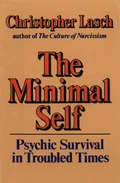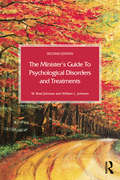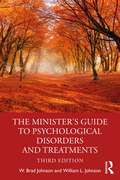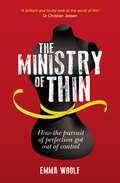- Table View
- List View
The Mindful Way through Depression: Freeing Yourself from Chronic Unhappiness
by Jon Kabat-Zinn Zindel Segal Mark Williams John TeasdaleThe revolutionary book that has helped hundreds of thousands of readers find relief from chronic unhappiness is now in a revised and updated second edition. This authoritative, easy-to-use self-help program is grounded in mindfulness-based cognitive therapy, a clinically proven approach. The expert authors explain why our usual attempts to "fix" sadness or "just stop thinking about it" can actually worsen depression, instead of relieving it. Through vivid stories and downloadable audio meditations encouragingly narrated by Jon Kabat-Zinn, the book shows how you can break the mental habits that lead to despair--and recover a sense of joy, aliveness, and possibility. Revised throughout to be even more reader friendly, the second edition features fresh insights on coping with the challenges of our ever-changing world, the latest scientific data, and four additional audio tracks. See also the authors' Mindful Way Workbook, which provides step-by-step guidance for building your mindfulness practice in 8 weeks. Plus, mental health professionals, see also the authors' bestselling therapy guide: Mindfulness-Based Cognitive Therapy for Depression, Second Edition.
The Mindful Way to a Good Night's Sleep: Discover How to Use Dreamwork, Meditation, and Journaling to Sleep Deeply and Wake Up Well
by Tzivia GoverThis accessible guide to cultivating deep, restful sleep — naturally — combines author Tzivia Gover’s expertise in both mindfulness and dreamwork. Along with a healthy dose of encouragement, Gover offers practical lifestyle advice, simple yoga poses, 10-minute meditations, and easy breathing exercises, plus visualization and journaling activities. You’ll also learn how to set the scene for safe, productive dreaming and cultivate your dream recall. This holistic approach extends into your waking hours with tips on morning routines to ensure that sound sleep leads to refreshed, more conscious living all day long.
The Mindful Workplace
by Michael ChaskalsonThis book offers a practical and theoretical guide to the benefits of Mindfulness-Based Stress Reduction (MBSR) in the workplace, describing the latest neuroscience research into the effects of mindfulness training and detailing an eight-week mindfulness training course.Provides techniques which allow people in organizations to listen more attentively, communicate more clearly, manage stress and foster strong relationshipsIncludes a complete eight-week mindfulness training course, specifically customized for workplace settings, along with further reading and training resourcesWritten by a mindfulness expert and leading corporate trainer
The Mindfulness Matters Program for Children and Adolescents: Strategies, Activities, and Techniques for Therapists and Teachers
by Christopher Willard Randye J. SempleThis indispensable resource provides a flexible framework and a wealth of engaging tools for teaching mindfulness to children and adolescents with varying needs in school or clinical settings. Numerous kid-friendly mindfulness practices are presented, complete with step-by-step instructions, sample scripts, suggested variations, and discussion questions. The benefits of mindfulness for enhancing children's social–emotional competencies are clearly explained. Clinicians and teachers are guided to select and sequence activities for groups struggling with specific challenges: stress and anxiety, depression, attention problems, behavioral and emotion regulation issues, and trauma. In a convenient large-size format, the book includes 14 reproducible handouts. Purchasers get access to a Web page where they can download and print the reproducible materials.
The Mindfulness Prescription for Adult ADHD: An 8-Step Program for Strengthening Attention, Managing Emotions, and Achieving Your Goals
by Daniel Siegel Lidia ZylowskaDo you:Have trouble paying attention and staying on task?Suffer from disorganization, procrastination, or forgetfulness?Have difficulty with restlessness or trouble managing strong feelings such as anger and frustration?Struggle with self-doubt and difficulty following through?In a way that causes problems in your relationships or your work?If so, you may have Attention Deficit Hyperactivity Disorder (ADHD)--like an estimated 8 million adults in this country. Physician-researcher Dr. Lidia Zylowska has created an 8-step program for using mindfulness practice (attention and awareness training) to overcome the symptoms of ADHD. The program includes practices such as sitting meditation, body awareness, thoughtful speaking and listening, development of self-acceptance, mindful self-coaching, cultivation of a balanced view of thoughts and emotions, and more. Dr. Zylowska educates readers about ADHD, helping them to understand how their ADHD brain works and how they can use mindful awareness to work with their challenges. She also explains how the mindful approach can be combined with other treatments, including medications, to boost self-improvement.This book is accompanied by an audio program of guided mindfulness exercises for successfully managing ADHD. The introduction to the book, titled "Dear Reader," includes a link to the free downloadable audio files.
The Mindfulness Revolution: Leading Psychologists, Scientists, Artists, and Meditatiion Teachers on the Powe r of Mindfulness in Daily Life
by Thich Nhat Hanh Jon Kabat-Zinn Jack Kornfield Daniel Siegel Barry BoyceA growing body of scientific research indicates that mindfulness can reduce stress and improve mental and physical health. Countless people who have tried it say it's improved their quality of life. Simply put, mindfulness is the practice of paying steady and full attention, without judgment or criticism, to our moment-to-moment experience. Here is a collection of the best writing on what mindfulness is, why we should practice it, and how to apply it in daily life, from leading figures in the field.Selections include:Leading thinking Jon Kabat-Zinn on the essence of mindfulness, stress reduction, and positive changeZen teacher Thich Nhat Hanh on the transformative power of mindful breathingProfessor of psychiatry Daniel Siegel, MD, on how mindfulness benefits the brainPhysician and meditation teacher Jan Chozen Bays, MD, on how and why to practice mindful eatingPioneering psychologist Ellen Langer on how mindfulness can change the understanding and treatment of diseaseLeadership coach Michael Carroll on practicing mindfulness at workPsychologist Daniel Goleman on a mindful approach to shopping and consumingPianist Madeline Bruser on how mindfulness can help us overcome performance anxietyand much moreThe Mindfulness Revolution also includes an in-depth discussion by writer-editor Barry Boyce about how mindfulness is being applied in a variety of professional fields--from health care to education, from performing arts to business--to improve effectiveness and enhance well-being.Learn more at www.mindful.org.
The Mindfulness Workbook
by Martha Langleyl Understand the core concepts and key benefits of mindfulness l Apply mindfulness skills to solve everyday problems and increase self-knowledge l Learn how to use formal daily meditation, mindful movement and breathing spaces l Manage stress, let go of worries and live fully in the moment l Improve relationships with family, friends and work colleagues Do you want to find a moment of calm in a busy world? Do you want to overcome negative thoughts and emotions and focus on what really matters? Do you want to free yourself from anxiety and stress? This new Teach Yourself Workbook doesn't just tell you how to use mindfulness to improve your life. It accompanies you every step of the way, with diagnostic tools, goal-setting charts, practical exercises, and many more features ideal for people who want a more active style of learning. Specially created exercises will help you to gain a new-found self-awareness. This book includes information on: Mindfulness Meditation Stress Anxiety Psychology Buddhism Self-help
The Mindfulness Workbook for ADHD: Effective Strategies to Increase Focus, Build Patience, and Find Balance
by Beata Lewis Nicole FoubiesterManage ADHD with mindfulness Living with ADHD can present challenges with focus and organization—but mindfulness is a proven way to stay centered. This workbook's practices, prompts, and tips will help you train your mind to cultivate greater focus and awareness.Understand ADHD—Explore the science and symptoms behind ADHD to better understand how it affects your behavior, and discover ways to remain grounded during those times.The power of mindfulness—Strengthen your ability to stay present with proven practices like breathing techniques, body scans, and mindful movement to exercise your sense of mindfulness every day.Equip your tool kit for adult ADHD—Get helpful strategies you can use daily or whenever you need some extra grounding, from mindful walking to breath exercises.Discover meaningful practices to create a sense of focus and mindfulness with this ADHD workbook for adults.
The Mindfulness Workbook for Addiction: A Guide to Coping With the Grief, Stress and Anger that Trigger Addictive Behaviors
by Rebecca E. Williams Julie S. KraftThe Mindfulness Workbook for Addiction offers a mindfulness based program for treating addiction created by two psychologists in the Veteran's Administration health care system. This unique approach addresses the grief and loss that are often at the root of addiction. Key Selling Points: ? One in eight American adults has a significant problem with alcohol or drugs (US Department of Health and Human Services). Page 60 of 83 TIP SHEET TIP SHEET ? Rebecca Williams and Julie Kraft are psychologists in the Veteran's Administration health care system, where addiction issues are rampant. Their unique approach to addiction management, presented in this book for the first time, links addiction to feelings of grief and loss. ? Research has indicated that mindfulness training is an effective treatment for emotion dysregulation, stress, depression, and grief--all issues that can lie at the root of addiction. This workbook incorporates the best techniques from dialectical behavior therapy (DBT), cognitive behavioral therapy (CBT), and acceptance and commitment therapy (ACT) for the treatment of addiction, including emotion regulation, distress tolerance, and defusion skills. Description: Most addictive behavior is rooted in some type of loss, be it the death of a loved one, coming to terms with limitations set by chronic health problems, or the end of a relationship. By turning to drugs and alcohol, people who have suffered a loss can numb their grief. In the process, they postpone their healing and can drive themselves further into addiction. The Mindfulness Workbook for Addiction offers readers an effective program for working through their addiction and grief with cognitive behavior therapy (CBT), dialectical behavior therapy (DBT), and acceptance and commitment therapy (ACT). Created by two psychologists who work for Veterans' Affairs, this mindfulness training workbook is effective for treating the emotion dysregulation, stress, depression, and grief that lie at the heart of addiction. No matter the loss, the mindfulness skills in this workbook help readers process their grief, determine the function their addiction is serving, and replace the addiction with healthy coping behaviors. Author Bio: Rebecca E. Williams, PhD, is a clinical psychologist specializing in recovery from mental illness and addictions. She is director of the Veterans Administration San Diego Healthcare System's Wellness and Vocational Enrichment Clinic and the Psychosocial Rehabilitation and Recovery Center. She is currently associate clinical professor in the Department of Psychiatry at the University of California, San Diego and adjunct faculty at the University of San Diego. She is coauthor of Couples Therapy for Alcoholism. Julie S. Kraft, MA, received her master's degree in marriage and family therapy from the University of San Diego's School of Leadership and Education Sciences. She has provided counseling to veterans and their family members at the Veterans Administration San Diego Healthcare System and provided psychotherapy to children, families, and couples in community settings. In her current position with Sharp Healthcare, Kraft treats clients struggling with both addiction and mental health concerns. She lives and works in San Diego, CA.
The Mindfulness Workbook for Anxiety: The 8-Week Solution to Help You Manage Anxiety, Worry & Stress
by Tanya J. PetersonReduce daily anxiety with a renewed approach to mindfulnessCurrent research has proven that mindfulness is an effective way to reduce and relieve anxiety. The Mindfulness Workbook for Anxiety delivers practical strategies for applying mindfulness to the daily events that cause anxiety and stress.From basic skills building to real-life application, The Mindfulness Workbook for Anxiety outlines simple techniques that are specially designed to replace anxiety with peace and wellbeing. Even those with no prior experience will find that the practical exercises outlined in The Mindfulness Workbook for Anxiety provide effective and lasting relief from the physical and emotional effects of anxiety.Presented in a straightforward, easy-to-navigate format, The Mindfulness Workbook for Anxiety offers:A well organized 8-week program for applying mindfulness to the root causes of your anxietyClear day-by-day guidance outlining the structure for specific mindfulness techniquesSimple activities designed to help you manage and decrease your anxiety symptomsPracticing mindfulness doesn't mean spending hours meditating. Even with a hectic schedule, finding relief from fear and worry is possible. With the practical 8-week structure presented in The Mindfulness Workbook for Anxiety you'll quickly build the tools you need to free yourself of anxiety and live a healthy, mindful life.
The Mindfulness Workbook for Depression: Effective Mindfulness Strategies to Cultivate Positivity from the Inside Out
by Yoon Im KaneLearn to lead a more positive life through mindfulnessMindfulness, the practice of living in the moment, can be an effective and empowering tool for managing depression. The Mindfulness Workbook for Depression will teach you how to practice mindfulness using simple exercises to help you build self-awareness and break through negative thought patterns.What sets this depression workbook apart from other mindfulness journals:Expert guidance from a licensed psychotherapist—Author Yoon Im Kane is a Yale University-trained psychotherapist and the founder of Mindful NYC, a psychotherapy center. She provides clear, concise direction and techniques she's honed over more than two decades in practice.Mindfulness basics—Learn how directing your attention to the present moment can help with managing information overload, reconnecting with your body, and instilling more self compassion.Healing exercises—Empower yourself with supportive exercises, like journaling and meditation, that will show you how to ground yourself, respond to difficult feelings, slow racing thoughts, and more.Positive affirmations—Each chapter ends with a positive phrase to bring you into the moment, a verbal touchstone you can repeat whenever you need it, like at the start of your day or before a big meeting.Mindfully manage your depression and become more positive from the inside out with The Mindfulness Workbook for Depression.
The Mindfulness Workbook for PTSD: Effective Mindfulness Techniques for Reducing Traumatic Stress and Living in the Moment
by Sabina Mauro PsyDRelieve your PTSD symptoms using mindfulness Dealing with PTSD is difficult, but with the right tools it's possible to find relief from your symptoms and liberate yourself from the past. This supportive mental health workbook can help you become more resilient with mindfulness strategies that will help you regulate your emotions and show yourself more compassion. What sets this PTSD workbook apart from other mental health books: An overview of PTSD and mindfulness—Discover how to identify the signs of PTSD and learn why the practice of mindfulness is so beneficial for managing its symptoms. Insightful self-reflection—Before you begin your mindfulness journey you'll assess your symptoms, take a look at the problems you're having as a result of your trauma, and learn how mindful you currently are. Empowering exercises—Immerse yourself in powerful mindfulness exercises centered on practicing emotional acceptance, breath awareness, interrupting negative thought patterns, and more. Hope for the future—Feel inspired and empowered on your recovery journey by regaining control of your life as you form healthy new habits you can turn to whenever you need them. Reduce the stress of your trauma and learn to live in the moment with The Mindfulness Workbook for PTSD.
The Mindfulness and Acceptance Workbook for Bulimia
by Emily K. Sandoz Troy Dufrene Kelly G. WilsonWritten by an eating disorder specialist and acceptance and commitment therapy (ACT) experts, The Mindfulness and Acceptance Workbook for Bulimia offers readers a plan for overcoming bulimia and negative body image through ACT.
The Mindfulness and Acceptance Workbook for Moral Injury: Acceptance and Commitment Therapy Skills for Moving Beyond Shame, Anger, and Trauma to Reclaim Your Values
by Robyn D. Walser Wyatt R. Evans Kent D. Drescher Jacob K. FarnsworthOn the front line of the COVID-19 response are thousands of healthcare providers working in strained systems with limited resources. Difficult decisions will be part of the experience of working under these circumstances. The moral dilemmas that providers may face in this crisis will undoubtedly lead to moral distress and emotional pain. <p><p> Providers may have to make decisions about life and death, determining who gets life-saving equipment and attention and who does not. Working long and stressful hours may lead to accidental mistakes, oversights, or inaction. Providers working in overburdened or under-resourced systems may experience a sense of being thwarted in their effort to keep their oath and live their values. For providers who hold values such as service, caring, or protection, these potentially morally injurious events may have lasting consequences. Anger, guilt, and shame may plague those suffering from these seemingly impossible situations. If providers become mired in this moral pain, they may find their personal and professional lives become increasingly burdened by moral injury. <p><p> The Moral Injury Workbook was developed to facilitate healing for people who have experienced a variety of moral violations and addresses a wide range of moral emotions—from guilt and shame to contempt and anger. It offers a step-by-step program to help readers move beyond their moral pain, reconnect with a fuller sense of self, and re-engage with deeply held values. <p><p> This workbook is a lifeline for healthcare providers in the midst of moral pain. Oriented toward and guided by values of caring and compassion, the content of this workbook may be meaningfully applied to and engaged in the personal and professional practices of all who read it. The six core processes of acceptance and commitment therapy (ACT) are broadly addressed in the workbook to apply to a range of moral injuries.
The Mindfulness for Warriors Handbook: Stress Reduction, Trauma Recovery, and Resilience Building for First Responders (Books That Save Lives)
by Kim ColegroveCoping with the Stress of First Responder Life“…a work of major importance that offers practical approaches to self-care and serenity for our first responders...” —Louise Harmon, author of Happiness from A to Z#1 New Release in Military FamiliesThe Mindfulness for Warriors Handbook is a new and expanded edition of Mindfulness for Warriors, providing an additional valuable resource for first responders.Ensuring their heads are in a healthy place is crucial. After 30 years in law enforcement, Kim Colegrove’s husband took his own life. This agonizing experience opened her eyes to the desperate need for an effective form of stress-relief and support for first responders like cops and EMTs facing trauma.A traumatic way of life. First responders have the incredibly difficult job of running toward danger while the rest of us run away. No training prepares them for what they see and endure. Kim understands what it’s like to watch someone go through that and is dedicated to helping first responders.A source of hope. In 2017, Kim founded The PauseFirst Project: Mindfulness for First Responders. She offers the PauseFirst block of training to organizations across the country; teaching techniques that help reduce stress, regulate emotion, and improve overall health and well-being. Her work to bring awareness is a tribute to both her husband and the countless other first responders struggling with the realities of their jobs.Inside find:Evidence-based practices to help first responders and families deal with stressInterviews with first responders who share stories of overcoming, surviving, and thrivingColegrove’s own raw and intimate story of her husband’s troubles and how she continues each day fighting in his memoryIf you’ve found encouragement from books like Bulletproof Spirit, Bullets in the Washing Machine, or I Love a Cop, you’ll find a further source of healing in The Mindfulness for Warriors Handbook.
The Mindfulness-Informed Educator: Building Acceptance and Psychological Flexibility in Higher Education
by Jennifer Block-Lerner LeeAnn CardaciottoThe Mindfulness-Informed Educator moves a growing body of evidence related to the efficacy of mindfulness- and acceptance-based approaches to the context of higher education, suggesting ways to foster psychological flexibility within and outside of the classroom. In the book, professionals across education and psychotherapy will find best practices for teaching, treating, researching, and serving their communities in ways that are sensitive to context, consistent with their values, and mindful of the diverse array of mental-health and behavioral difficulties experienced by college and university students. Chapters incorporate the most cutting-edge research across disciplines and span educational levels and contexts within higher education, provide strategies for strengthening mindfulness- and acceptance-based pedagogy and program development, and provide user-friendly supplemental materials such as transcripts and sample assignments.
The Minds of Billy Milligan
by Daniel KeyesReconstructs the case of a young man who was arrested in 1977 as the Ohio "campus rapist." Under psychiatric observation he was found to possess twenty-four distinct personalities, including those of a lesbian, a painter, an Englishman, an escape artist, a con man, and a small deaf boy.
The Minds of Billy Milligan
by Daniel Keyes'Fascinating' LA Times '[Keyes] has carried it off brilliantly, bringing not only a fine clarity but a special warmth and empathy' Washington PostBilly Milligan was a man tormented by twenty-four distinct personalities battling for supremacy - a battle that culminated when he awoke in jail, arrested for the kidnap and rape of three women. In a landmark trial, Billy was acquitted of his crimes by reason of insanity caused by multiple personality disorder - the first such court decision in history. Among the twenty-four are: Philip, a petty criminal; Kevin, who dealt drugs; April, whose only ambition was to kill Billy's stepfather; Adalana, the shy, affection-starved lesbian who 'used' Billy's body in the rapes that led to his arrest; David, the eight-year-old 'keeper of the pain'; and the Teacher, the sum of all Billy's alter egos fused into one. In The Minds of Billy Milligan, Daniel Keyes brings to light the most remarkable and harrowing case of multiple personality ever recorded.
The Miniature Guide To Critical Thinking Concepts And Tools
by Richard Paul Linda ElderThis miniature guide, which has sold more than half a million copies, is widely used in teaching and learning, in personal and professional life. It distills the essence of critical thinking into a 24-page, pocket-sized guide. It introduces the interrelated complex of critical thinking concepts and principles implicit in the works of Richard Paul and Linda Elder. This guide is widely used at the college level. It can be used as a critical thinking supplement to any textbook or course.
The Minimal Self: Psychic Survival in Troubled Times
by Christopher Lasch"Even more valuable than its widely praised predecessor, The Culture of Narcissism." --John W. Aldridge Faced with an escalating arms race, rising crime and terrorism, environmental deterioration, and long-term economic decline, people have retreated from commitments that presuppose a secure and orderly world. In his latest book, Christopher Lasch, the renowned historian and social critic, powerfully argues that self-concern, so characteristic of our time, has become a search for psychic survival.
The Minimalist Program
by Fahad Rashed Al-MutairiThe development of the Minimalist Program (MP), Noam Chomsky's most recent generative model of linguistics, has been highly influential over the last twenty years. It has had significant implications not only for the conduct of linguistic analysis itself, but also for our understanding of the status of linguistics as a science. The reflections and analyses in this book contain insights into the strengths and the weaknesses of the MP. Among these are, a clarification of the content of the Strong Minimalist Thesis (SMT); a synthesis of Chomsky's linguistic and interdisciplinary discourses; and an analysis of the notion of optimal computation from conceptual, empirical and philosophical perspectives. This book will encourage graduate students and researchers in linguistics to reflect on the foundations of their discipline, and the interdisciplinary nature of the topics explored will appeal to those studying biolinguistics, neurolinguistics, the philosophy of language and other related disciplines.
The Minister's Guide to Psychological Disorders and Treatments
by W. Brad Johnson William L. JohnsonThe Minister’s Guide to Psychological Disorders and Treatments, 2nd ed, is a thorough yet succinct guide to everything a minister might need to know about the most common psychological disorders and the most useful mental-health treatments. Written in straightforward and accessible language, this is the minister’s one-stop guide to understanding common mental health problems, helping parishioners who struggle with them, and thinking strategically about whether to refer—and if so, to whom. This thoroughly updated edition is fully aligned with the latest edition of the Diagnostic and Statistical Manual of Mental Disorders (DSM-V) and the latest evidence regarding evidence-based psychological treatments. The second edition also contains a new chapter on ministerial triage as well as additions to the DSM-V such as autism spectrum disorder and somatic symptom disorders. Written with deep empathy for the demands of contemporary pastoring, this guide is destined to become an indispensable reference work for busy clergy in all ministry roles and settings.
The Minister's Guide to Psychological Disorders and Treatments
by W. Brad Johnson William L. JohnsonIn its third edition, The Minister’s Guide to Psychological Disorders and Treatments is the definitive guide to everything a minister might need to know about the most common psychological disorders and current evidence-based mental health treatments. Written in straightforward and accessible language, this is the minister’s one-stop guide to understanding common mental health problems, helping parishioners who struggle with them, and thinking strategically about whether to refer —and if so, to whom. This updated edition is fully aligned with the latest edition of the Diagnostic and Statistical Manual of Mental Disorders (DSM-5-TR) and the most current evidence-based psychological treatments. This third edition infuses significant attention to culture and diversity, with diverse case examples and fresh content on cultural humility, diagnostic interviewing, assessment, sociocultural contributors to mental health disorders, such as religious community, race, and gender. The third edition also includes coverage of more treatment strategies such as mindfulness, medical cannabis, and light therapy for seasonal depression, as well as revised sections and updated references on major psychological disorders and childhood and relationship problems, including gender dysphoria, binge eating disorder, and intellectual disabilities. Written with deep empathy for the demands of contemporary pastoring, this guide is destined to become an indispensable reference work for busy clergy in all ministry roles and settings.
The Ministry of Thin: How the Pursuit of Perfection Got Out of Control
by Emma WoolfThe Ministry of Thin takes an unflinching look at how the modern obsession with weight loss, youth, beauty and perfection got out of control. Emma Woolf, author of An Apple a Day, explores how we might all be able to stop hating and start liking our own bodies again. And she dares to ask: if losing weight is the answer, what is the question?
The Ministry of Thin: How the Pursuit of Perfection Got Out of Control
by Emma WoolfThe Ministry of Thin takes an unflinching look at how the modern obsession with weight loss, youth, beauty and perfection got out of control. Emma Woolf, author of An Apple a Day, explores how we might all be able to stop hating and start liking our own bodies again. And she dares to ask: if losing weight is the answer, what is the question?
